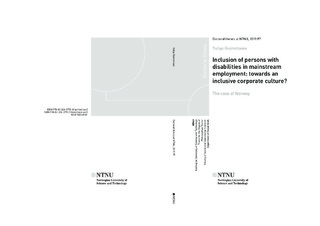| dc.contributor.advisor | Hvinden, Bjørn | |
| dc.contributor.advisor | Halvorsen, Rune | |
| dc.contributor.author | Kuznetsova, Yuliya | |
| dc.date.accessioned | 2019-05-21T08:33:30Z | |
| dc.date.available | 2019-05-21T08:33:30Z | |
| dc.date.issued | 2019 | |
| dc.identifier.isbn | 978-82-326-3793-5 | |
| dc.identifier.issn | 1503-8181 | |
| dc.identifier.uri | http://hdl.handle.net/11250/2598189 | |
| dc.description.abstract | Summary:
The adoption of the UN Convention on the Rights of Persons with Disabilities and EU equal opportunities legislation have intensified the expectations to employers to actively recruit and retain persons with disabilities in the workforce. The thesis contributes new knowledge on how large multinational companies respond to these expectations. The data demonstrate a major discrepancy between the official statements and the actual practices of the companies. The Norwegian companies revealed a high commitment to their own employees and provided work training under the IA Agreement. Yet, it was far from ensuring a corporate culture inclusive to persons with disabilities. An in-depth study of two Norwegian companies finds that both companies complied with accessibility standards. However, the ability or willingness to accommodate working hours, task or office space to jobseekers with disabilities was limited. The managers’ awareness about the legal obligations and possibilities for reimbursement of accommodation costs from the Norwegian Welfare Administration was low or considered less important for their hiring practice. A comparison of companies in Norway and Sweden finds that the Swedish companies were more proactive than the Norwegian, especially regarding persons with intellectual and learning difficulties.
Overall, the findings suggest that a disability-inclusive corporate culture may depend both on external factors such as national policies and internal factors such as corporate policies, human resource strategies, and the managers’ and co-workers’ attitudes, support and awareness. National policy matters. However, non-discrimination policies are not enough. Financial support, advice and information provided by the government, and collaboration with organisations of persons with disabilities are equally important factors to promote an ‘inclusive corporate culture’.
The thesis has examined the commitment of large multinational companies to recruit, hire and retain persons with disabilities in the workforce. The main findings come from interviews conducted in two multinational companies with offices in Norway. Additionally, the thesis report on findings from a comparison of the practices of the two companies in Norway with two companies in Sweden, a comparison of disability policies in Norway, Sweden, Denmark, Estonia, Latvia, and Lithuania, and the Norwegian Disabled People Labour Force Survey 2006-2015. | nb_NO |
| dc.description.abstract | Norsk sammendrag:
FNs konvensjon om rettighetene til mennesker med nedsatt funksjonsevne og EUs rammedirektiv for å fremme like muligheter i arbeidslivet har bidratt til økte krav og forventninger til arbeidsgivere om å arbeide aktivt for å rekruttere og beholde personer med nedsatt funksjonsevne i arbeidslivet Avhandlingen bidrar til ny kunnskap om hvordan store, flernasjonale selskaper svarer på disse kravene og forventningene. Dataene viser at det er et stort gap mellom selskapenes offisielle selvpresentasjon og deres faktiske praksiser. De norske selskapene viste stort engasjement for sine ansatte og tilbød arbeidstrening som en del av avtalen om et inkluderende arbeidsliv («IA-avtalen»). Likevel hadde de mye utgjort når det gjaldt å sikre en inkluderende bedriftskultur for personer med nedsatt funksjonsevne. Et case studie av to norske firmaer fant at begge selskapene etterlevde tilgjengelighetsstandarder. Evnen eller viljen til å tilpasse arbeidstid, arbeidsoppgaver eller kontorlandskapet til jobbsøkere med funksjonsnedsettelser var imidlertid begrenset. Kunnskapen om de lovpålagte pliktene og mulighetene for NAV til å refundere kostnader var lav eller av liten betydning for deres rekrutteringspraksis. I en sammenligning av selskaper i Norge og Sverige fant Kuznetsova at de svenske bedriftene var mer proaktive enn de norske, spesielt når det gjaldt personer med lærevansker og psykisk utviklingshemmede.
Avhandlingen viser at en inkluderende bedriftskultur avhenger både av eksterne faktorer som den nasjonale politikken, og interne faktorer som bedriftskultur, HR-strategier, bedriftlederes og kollegaers holdninger, støtte og bevissthet. Nasjonal politikk spiller en rolle. Ikke-diskrimineringspolitikk er imidlertid ikke nok. Det er også behov for økonomiske støtteordninger, rådgivning og informasjon fra myndighetene, og samarbeid med funksjonshemmedes organisasjoner.
Kuznetsova har analysert hvilke faktorer som påvirker hvorvidt store, flernasjonnale selskaper rekrutterer og beholder personer med nedsatt funksjonsevne i arbeidsstyrken. Hovedfunnene er basert på intervjuer i to internasjonale firmaer med kontorer i Norge. I tillegg rapporterer avhandlingen funn fra en sammenligning med to tilsvarende selskaper i Sverige, sammenligning av funksjonshemmingspolitikk i Norge, Sverige, Danmark, Estland, Latvia og Litauen, samt analyser av den norske arbeidskraftsundersøkelsen, modulene om personer med nedsatt funksjonsevne 2006-2015. | nb_NO |
| dc.language.iso | eng | nb_NO |
| dc.publisher | NTNU | nb_NO |
| dc.relation.ispartofseries | Doctoral theses at NTNU;2019:97 | |
| dc.relation.haspart | Paper 1: Kuznetsova, Yuliya. An inclusive corporate culture: Examining the visible and invisible levels of disability inclusiveness in two large enterprises. Scandinavian Journal of Disability Research 2016 ;Volum 18.(3) s. 179-190
Attribution 4.0 International (CC BY 4.0)
http://doi.org/10.1080/15017419.2015.1063541 | nb_NO |
| dc.relation.haspart | Paper 2: Kuznetsova, Yuliya; Yalcin, Betul. Inclusion of persons with disabilities in mainstream employment: is it really all about the money? A case study of four large companies in Norway and Sweden. Disability & Society 2017 ;Volum 32.(2) s. 233-253
- Is not included du to copyright available at
https://doi.org/10.1080/09687599.2017.1281794 | nb_NO |
| dc.relation.haspart | Paper 3: Kuznetsova, Yuliya; Yalcin, Betul; Priestley, Mark. Labour Market Integration and Equality for Disabled People: A Comparative Analysis of Nordic and Baltic Countries. Social Policy & Administration 2017 ;Volum 51.(4) s. 577-597
https://doi.org/10.1111/spol.12314| | nb_NO |
| dc.relation.haspart | Paper 4: Kuznetsova, Yuliya; Cerdeira Bento, João Paulo. Workplace adaptations promoting the inclusion of persons with disabilities in mainstream employment: A case-study on employers' responses in Norway. Social Inclusion 2018 ;Volum 6.(2) s. 34-45
This article is licensed under a Creative Commons Attribution 4.0 International License (CC BY)
https://doi.org/10.17645/si.v6i2.1332 | nb_NO |
| dc.title | Inclusion of persons with disabilities in mainstream employment: towards an inclusive corporate culture? | nb_NO |
| dc.type | Doctoral thesis | nb_NO |
| dc.subject.nsi | VDP::Social science: 200::Social work: 360 | nb_NO |

